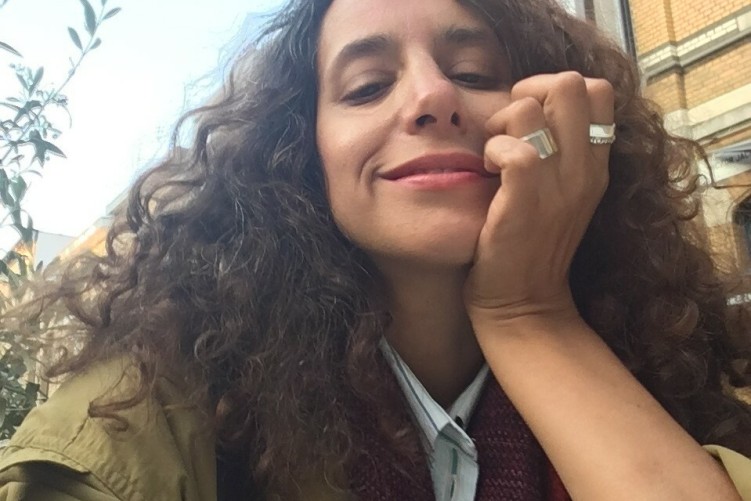Do you remember your earliest writing jitters?
Ever since I was seven, I write down my thoughts and my stories in notebooks. Writing is a reliable ritual for me, a way to create meaning and to connect with myself and the world. I have a busy mind, with a lot happening at once, and the repetitive activity of writing grounds me. I love lists, letters, collages, manuscripts, writing on scrap paper, in books. When I haven't put anything on paper for a few days, I notice it immediately.
Who or what has influenced your personal writing journey?
For a long time, I intuitively felt that writing was something very physical for me. When I discovered Lidia Yuknavitch, a writer who teaches "corporeal writing," I didn't hesitate and enrolled in her writing courses. Her approach to writing from the body makes perfect sense to me. You can write from the first or third person, but a body also has a narrative perspective - one that always offers inspiration. Our skin alone holds so many memories, tensions, sensations ... Your body is literally full of stories.
What is the best writing advice you ever heard yourself?
Cheryl Strayed once said, "Write like a motherfucker." That impetuosity and uninhibitedness fits well with my understanding of the writing process. Beyond the panic, beyond the ideas of what writing is supposed to be, beyond so-called big themes you think you need to cover. For me, the beginning of the writing process is a bit like opening a champagne bottle: let it pop and don't stop when you start making a mess.
Are there any topics or themes that particularly fascinate you?
I recently read Paradise Rot by Jenny Hval, a very sensual and fascinating novel. It's about a college student who rents a room in a strange house that is "alive" and where the boundaries between spaces, bodies and plants are blurred. I love reading quirky authors like that, like Akwaeke Emezi, Roxanne Gay, Mieko Kawakami, Garth Greenwell. All of them write about the body in a very unique way and challenge traditional storytelling structures.
I find it very fascinating when writers describe a world that is much less defined than you would find in more traditional literature. The human experience is fragmented and often far from delineated, rarely having a classic beginning-middle-end structure or linear span. Experimental forms of writing that try to reproduce this fragmentation, are a fascinating counter-movement today.
For me, writing is like opening a bottle of champagne: let it pop at loud and don't stop when you start making a mess.
Your course topics at WISPER are not for the light-hearted: eroticism, loss.... As a teacher, how do you deal with the fraught nature of that?
Writing erotic stories is indeed out of the comfort zone for most. Moreover, it is incredibly difficult. Did you know that even the great Murakami once landed on the long list of the Bad Sex Writing Awards? That's why I continue to emphasize experimentation in my classes, under the motto "perfectionism is the killer of creativity”. From the start of the course, I try to install that: in order to write, you must dare to fail on paper.
Once that shared feeling of being allowed to fail is there, a safe group atmosphere is created in which we can let go of the idea of neat, perfect sentences and in which creativity is given space. Furthermore, reading and writing together about vulnerable themes such as the body, change, loss, transformation ... creates a very strong bond between people.
When is a course successful for you as a teacher?
The connection between students that arises during the classes gives me enormous drive. Therefore, the energy in the group is very important. I want to create a kind of lab for my participants, a 'magical space' in which everyone feels free to experiment. This is crucial to becoming familiar with your own voice. Especially for people who don't write in the traditional way, who feel isolated, who are searching or who see their own voice much less represented in mainstream literary offerings.
Are there other artistic disciplines besides literature to which you are drawn?
I published "Bedmonk," a little book about mourning and being sick. For that, I made my own transverse line drawings to accompany my texts. These are anything but consistent with the conventional guidelines of what a drawing should look like and therefore were not made with the goal of being accurate and representative. For me, they are rather intuitive expressions: my ambition is not to draw, but to tell!
Did you get curious after reading this interview?





